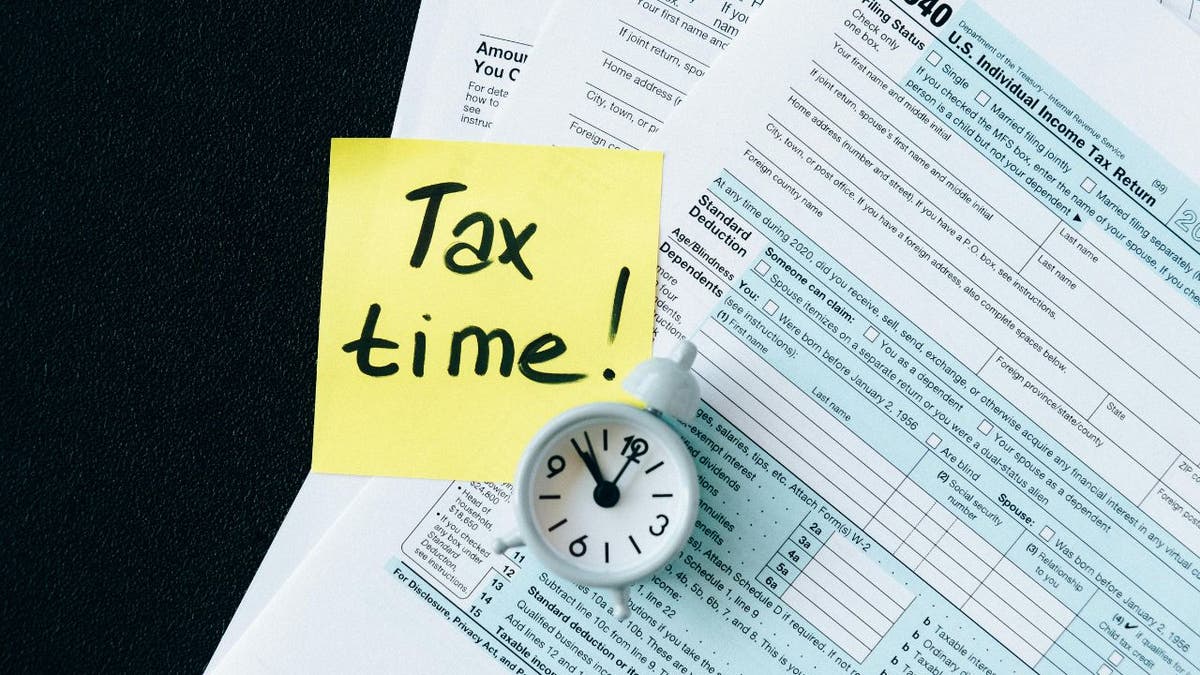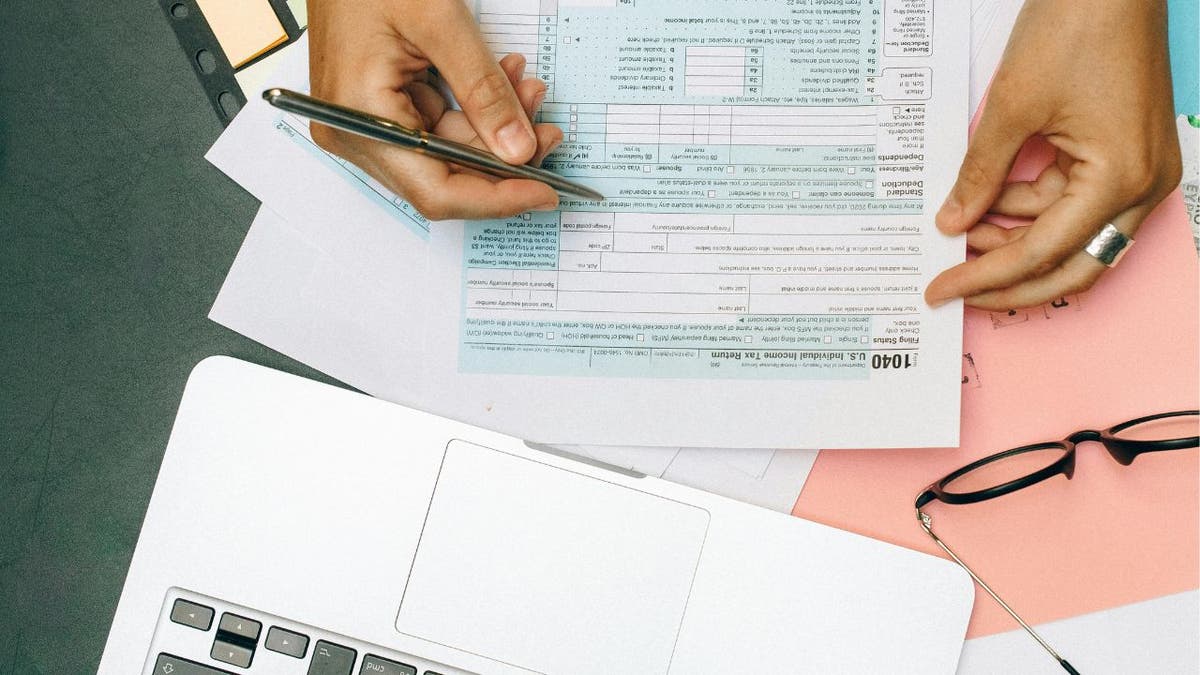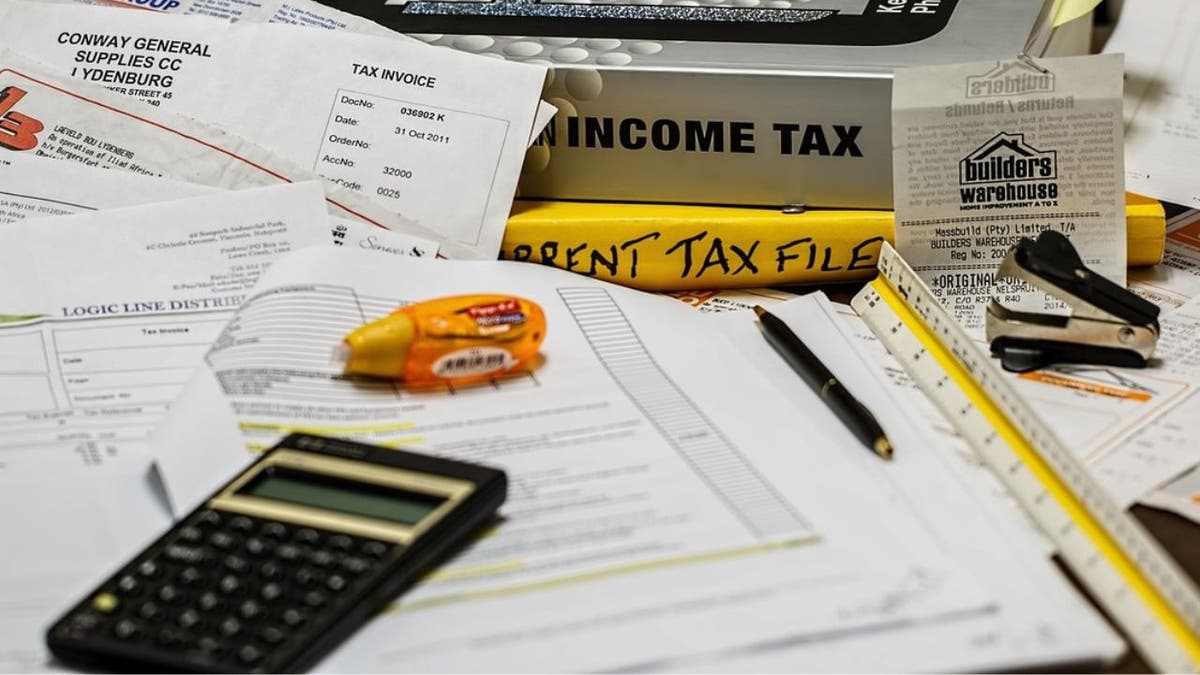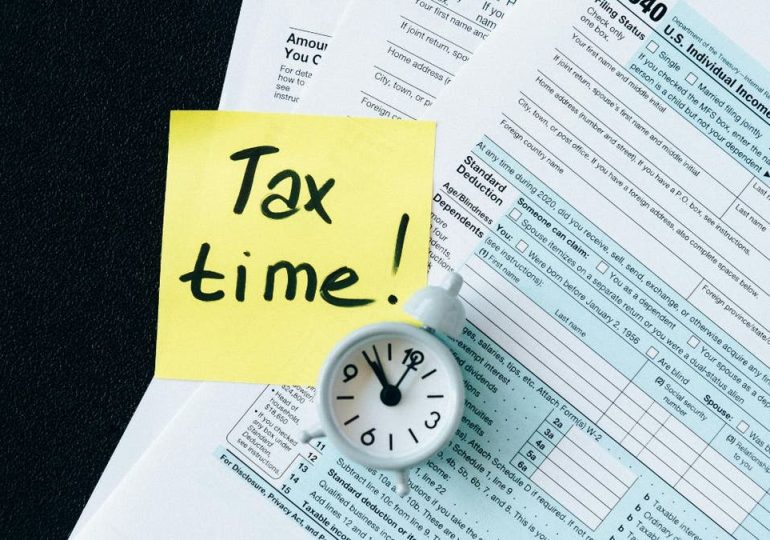Tax season isn’t fun for most people, but it can be downright miserable if you fall for a scam. This year, there’s been a noticeable uptick in scam callers impersonating IRS officials, and with the rise of AI-voice programs, these scams have become more convincing than ever.
The IRS flagged 2.4 million tax returns with refunds totaling roughly $13.8 billion for possible identity theft. Identity thieves use stolen information — like your SSN, name, address and more — to file fraudulent tax returns in your name.
Meanwhile, the Better Business Bureau’s (BBB) Scam Tracker collects reports on tax scams from the public. For scams reported as tax collection to BBB’s Scam Tracker in 2023, the median dollar loss was $2,100.
Here are some of the scams the BBB warns you to look out for this tax season.
“Tax time” post-it on tax documents. (Kurt “CyberGuy” Knutsson)
1. Phone scams
Scammers pretend to be someone from the IRS and call you to ask to make back payments or send over personal information that can’t be found in the IRS system. They often pressure you to act immediately, thre atening arrest or fines if you don’t comply.
In 2024, phone scammers have gotten so sophisticated that they will create fake badge numbers, get a fake caller ID name that appears to be from the government or leave official-sounding robocalls with the help of AI voiceovers.
NEW IRS CRACKDOWN ON ‘HIGH-INCOME’ TAX CHEATS OWING HUNDREDS OF MILLIONS
2. Phishing email scams
Phishing emails are scam emails designed to get personal information from you. Scammers will text, email or even message you on social media, claiming to be an IRS agent, and they will send you a link to a fake IRS website designed to steal your Social Security number and other sensitive personal data. Always remember: the IRS will never communicate with you via email but instead by physical USPS mail.

A person preparing their tax documents. (Kurt “CyberGuy” Knutsson)
3. Signs of tax-related identity theft
1. If you try to file your tax return by mail and receive a letter from the IRS stating that they have already received a return in your name, that could mean your identity has been compromised.
2. Also, if you go to file your tax return electronically and the IRS alerts you that someone filed for your return using your Social Security number, then you have likely been a victim of identity theft.
3. Lastly, if the IRS sends you a letter stating that you have created a new online account and you know you didn’t do this, that is a dead giveaway that your identity may have been stolen.

Tax documents. (Kurt “CyberGuy” Knutsson)
MORE: THE URGENT PAYPAL EMAIL SCAM YOU CAN’T AFFORD TO IGNORE
Stay safe with these 8 tips from the Better Business Bureau
Tip 1 – File early
Filing early is one of the most sure-fire ways to keep yourself safe during tax season. If you file as soon as possible, there’s less of a chance someone can steal your identity by filing your taxes before you do. Always make sure to have all of your tax documents ready when you start to file.
Tip 2 – Know how the real IRS will contact you
The IRS doesn’t send emails, and their agents will never text you or contact you on social media. Typically, the IRS will only contact you through postage mail, but there is a chance that an IRS agent may perform an in-person visit, but only after confirming the visit via postage mail.
Tip 3 – Get an identity protection PIN (IP PIN) from the IRS
An easy way to add an extra layer of security to yourself is by getting an Identity Protection PIN, or IP-PIN, from the IRS. An IP-PIN is a six-digit number that the IRS uses to confirm your identity. It can help identify you even when someone nefarious has accessed your Tax ID and Social Security number. Signing up for an IP-PIN is easy and can be done online at IRS.gov, and the IRS will mail you a new IP-PIN after you opt-in every December.

Calculator and tax documents. (Kurt “CyberGuy” Knutsson)
MORE: BEWARE OF THE ‘SAY YES’ PHONE SCAM
Tip 4 – Know how the IRS accepts payments
The IRS never demands immediate payment and will never ask for a credit card number or bank information over the phone. Never, under any circumstances, pay any money to someone claiming to be an IRS agent asking for cryptocurrency, digital gift cards or wire transfers.
Tip 5 – Know the signs of fraud
If the IRS informs you that either your return has already been filed or that you received wages from an employer you aren’t familiar with, you need to visit an IRS office in person as soon as possible to ensure you haven’t fallen victim to fraud.
Tip 6 – Protect your information
Ensure you keep all documents related to your taxes in a secure location, such as a home filing cabinet or on a password-protected computer. Generally, never give out your Social Security number unless absolutely necessary.
Tip 7 – Only use secure filing websites
Always make sure you are accessing the real IRS website by checking that the URL is spelled correctly. Look for the lock symbol next to the URL in your browser’s search bar to tell you that your connection to the IRS’s website is secure.
Tip 8 – Report any suspected scams
If you receive a phone call or email asking for important tax information, hang up immediately. Report the call first to the IRS. Next, you should make a report to the Federal Communications Commission. Finally, head to the Better Business Bureau and report the scam to their scam tracker.

Person upset by what he sees. (Kurt “CyberGuy” Knutsson)
MORE: HOW SCAMMERS USE GOOGLE VOICE VERIFICATION CODES TO STEAL YOUR IDENTITY AND MONEY
5 things to do if you are a victim of identity theft
1. Complete IRS Form 14039, the Identity Theft Affidavit: This is the form that all victims of fraud have to fill out for the IRS. This will let them know that the person who is claiming to be you is a fraud. You can find the form on the IRS website.
2. Request a copy of the fraudulent tax return from the IRS: You can do this by going to this page on the IRS website on dealing with fraudulent returns and following the instructions to order a copy.
3. Alert national credit bureaus: Let the national bureaus like Experian, Equifax and TransUnion know that there has been fraud and place a freeze on your account so that the scammers cannot get to it.
4. Report the crime to the Federal Trade Commission: The FTC is there to help track down scammers, and your report can also help them keep a record of how many scams are happening in a single year so that they can better improve how to warn others. You should also report the crime to identitytheft.gov
5. Check your online bank accounts: Make sure there aren’t any suspicious transactions on any of your accounts.
GET FOX BUSINESS ON THE GO BY CLICKING HERE

A woman is upset while preparing her taxes. (Kurt “CyberGuy” Knutsson)
MORE: TOP WAYS TO SAFEGUARD AGAINST SOCIAL SECURITY NUMBER FRAUD
How can you protect yourself from tax-related identity theft?
Use an identity theft protection service: Identity theft companies can monitor personal information like your Social Security number (SSN), phone number and email address and alert you if it is being sold on the dark web or being used to open an account. They can also assist you in freezing your bank and credit card accounts to prevent further unauthorized use by criminals.
One of the best parts of using some services is that they might include identity theft insurance of up to $1 million to cover losses and legal fees and a white glove fraud resolution team where a U.S.-based case manager helps you recover any losses. See my tips and best picks on how to protect yourself from identity theft.
Have good antivirus software: The best way to protect yourself from clicking malicious links that install malware that may get access to your private information is to have antivirus protection installed on all your devices. This can also alert you of any phishing emails or ransomware scams. Get my picks for the best 2024 antivirus protection winners for your Windows, Mac, Android & iOS devices.
Kurt’s key takeaways
Going from winter into spring may seem like an intense time with scammers due to the tax season immediately following the holiday shopping season. However, the reality is that scammers work around the clock and are active all year. These tips from the Better Business Bureau are a helpful reminder of ways to keep yourself safe from scammers throughout the year.
CLICK HERE TO GET THE FOX NEWS APP
How do you feel about the rise of AI-voice programs and their use in phone scams? Does it make you not even want to pick up the phone? Let us know by writing us at Cyberguy.com/Contact
For more of my tech tips & security alerts, subscribe to my free CyberGuy Report Newsletter by heading to Cyberguy.com/Newsletter
Ask Kurt a question or let us know what stories you’d like us to cover.
Answers to the most-asked CyberGuy questions:
Copyright 2024 CyberGuy.com. All rights reserved.












